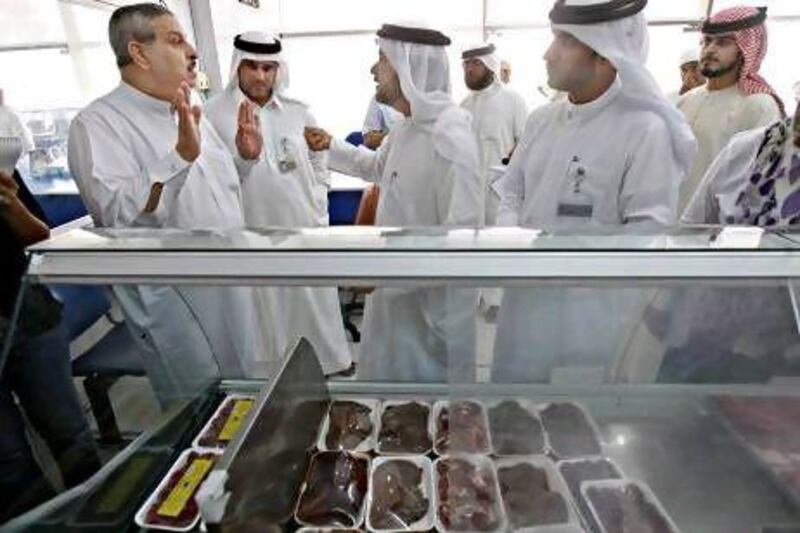SHARJAH // Several stalls at Sharjah's meat market had their trading licences confiscated by the Ministry of Economy yesterday, mostly for failing to comply with Ramadan price controls.
Fourteen of the 116 stallholders were also fined Dh5,000 by Dr Hashim Al Nuaimi, the head of consumer protection at the ministry, after they displayed hefty prices or failed to display any at all.
At Al Saqr Livestock and Meats shop, Australian lamb was priced Dh38 per kilogramme and Somali lamb at Dh35. Too expensive, said Dr Al Nuaimi.
"They should all cost Dh30 and no more, they buy it live for Dh27 so they should not go over Dh30," he said, pointing to the shop's price list.
The ministry's tour of the emirate's fruit, vegetable and meat markets was part of its campaign to monitor food prices across the country during the Holy Month.
Next door, Eissa Al Sooqi Meat and Livestock displayed no price for his meat, an error which cost him his licence.
"There are no prices and it's very dirty," said Majid Mohamed Al Owais, the manager at the ministry's Sharjah office.
"We will send inspectors to come back later and check whether that has changed."
Most of the meat shops appeared dirty and did not store their food in proper cool conditions.
At the neighbouring Lahore Meat Shop, almost all the meat was sold at Dh35. "What a sight," said Dr Al Nuaimi. "He also doesn't have any air conditioning and he will be fined Dh5,000 twice because of this."
But the shopkeeper insisted he was about to change his prices for Ramadan. "I was going to change them today, I know they're meant to be lower," he said.
"Dropping my prices by Dh5 will not affect my business so much and it's for Ramadan, so it's alright. But these fines will definitely set me back."
Next door, Mohammed Farouk Abou Thabet, the owner of Al Khalil shop, was outraged at his Dh10,000 fine.
Not only were his prices too high - Dh55 for Australian beef steak and Dh35 for Australian boneless beef leg - but most of his meat bore no expiry date.
"It's Ramadan, your prices should not be this high," insisted Dr Al Nuaimi. But Mr Abou Thabet tried to justify his prices. "I don't want to make any profit during Ramadan but these prices need to be set," he said.
But his meat had no expiry date, and no municipality stamp, costing him a Dh10,000 fine. "There must be expiry dates and a stamp from the municipality," said Dr Al Nuaimi. "It needs to go through the municipality first."
The fruit and vegetable market, however, was in better shape. A few shops were ordered to fix broken scales, but no licences were confiscated and most high prices were reduced by 25 per cent. A Dh25 bag of potatoes was reduced to Dh20 while a bag of onions dropped from Dh33 to Dh25.
At Yousif Mohammed Vegetable shop, a box of tomatoes cost Dh28 which Dr Al Nuaimi reduced himself.
"It's too much for tomatoes," he said, writing the new price on the tag. "Because it's not their season, people depend on Jordan and Palestine to get them, but in one month, prices will drop from Dh25 a kilogramme to Dh15."
Shop owners welcomed the price reductions, most saying the reductions would not affect their business.
And the overall situation has improved since last year when more than half of the market's stalls had their licences confiscated.
"It is better than last year and it is also better than the market in Abu Dhabi, where the most fines have been given out so far," said Dr Al Nuaimi.
But a few shops were dirty. "Inspectors from the municipality and the Department of Economic Development will visit in the next week to ensure these problems have been taken care of," said Dr Al Nuaimi.
"These visits have led to a decrease in consumer exploitation. We will never allow traders to exploit consumers for these basic items and they will be fined if they are found flouting the law, " Dr Al Nuaimi added.






